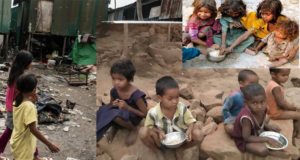 The COVID-19 pandemic and growing living costs increased extreme poverty in emerging Asian countries by over 68 million last year.
The COVID-19 pandemic and growing living costs increased extreme poverty in emerging Asian countries by over 68 million last year.
On Thursday the Asian Development Bank (ADB) released a report which stated that more than 155 million people in developing Asia would live in extreme poverty in the year 2022. When compared to what it would have been without the epidemic, this figure is greater by 67.8 million.
According to the ADB, individuals are considered to be in a state of extreme poverty when they are living on less than $2.15 a day, adjusted for purchasing power and inflation.
Albert Park, Chief Economist at the ADB, remarked, “Asia and the Pacific are making gradual strides towards recovery from the COVID-19 pandemic, but the mounting cost of living is eroding progress in poverty alleviation.”
The burgeoning cost of living has emerged as a critical concern, impacting people’s ability to afford essential commodities such as food and fuel across forty-six developing economies of Asia, excluding Japan.
This surge in prices for basic goods and services has not only eroded people’s savings but also strained their capacity to afford other crucial necessities including healthcare, education, investments, and growth-enabling opportunities.
The report also sheds light on a concerning trend: individuals grappling with poverty often pay a premium to access essential goods and services. For instance, low-income households frequently find themselves buying goods in smaller quantities, which is costlier than purchasing in bulk. Furthermore, residing in informal settlements exposes them to heightened health risks, leading to increased healthcare expenses.
Despite emerging economies in Asia and the Pacific showing signs of progress against poverty, projections indicate that by 2030, over 1.26 billion individuals, equivalent to 30.3 percent of the population, will still be economically insecure—living on $6.85 per day (2017 prices).
To mitigate the escalating cost of living, the report calls upon governments across Asia and the Pacific to strengthen social protection systems, enhance support for agricultural development, improve access to financial services, prioritize strategic infrastructure investments, and foster technological innovation and human capital development.
The ADB contends that these measures will play a pivotal role in alleviating the strain on individuals facing economic vulnerabilities.



